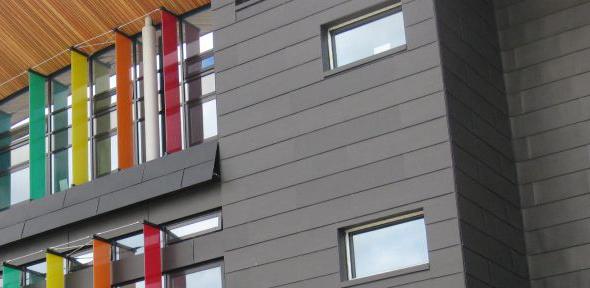
Maxwell Centre operation
Spread over four floors, the Maxwell Centre building provides office space for over 250 people, state-of-the-art laboratories, and a variety of meeting rooms and communal spaces to encourage interactions. The Maxwell Centre vision and community extend beyond the new building alone, acting as a gateway to Physical Sciences and Technology in West Cambridge.
Working with external partners
The university has many different models for successful collaborations. These range from advice, consultations and one day exploratory workshops to sharing expertise and know-how through strategic partnerships lasting over decades. The Maxwell Centre will offer long-term or hot-desking presence, supporting collaborative research projects, studentships, pump-priming initiatives and more.
Networking with the University
The Maxwell Centre provides connectivity across the University of Cambridge around:
- Interdisciplinary themes: through the Strategic Research Initiatives, Networks and Interdisciplinary Research Centres including Energy @ Cambridge, BigData, Global Challenges and CamBridgeSens.
- Knowledge Exchange: Knowledge Transfer Facilitators embedded in all major Physical Sciences and Technology departments - offering support for commercialisation of ideas, research impact delivery, and brokering connections with industry.
- Corporate partnerships: through Strategic Partnerships Office, who offer institutional level relationship management and a dedicated Business Relations team.
- New ventures, IP licensing, technology transfer and consultancy: with the support of Cambridge Enterprise.
The Maxwell Centre liaison team provides a point of contact and consultation for external organisations wishing to work with us on research. We can help you navigate to the relevant University of Cambridge expertise and put you in touch with people you should to be talking to.
Shared-access facilities
The Maxwell Centre houses shared equipment facilities, available for use by academia and industry, including:
- The ESPRC/Winton advanced materials characterisation suite: x-ray, magnetic and electrical characterisation tools for complex materials
- Henry Royce Institute for Advanced Materials Research – Cambridge site: versatile equipment for low temperature materials processing, in-situ and environmental characterisation tools
- The EPSRC Centre for Doctoral Training in Nanoscience characterisation facilities: optical and structural characterisation of nanoparticles and nanostructures
- Optics laboratories: ‘fast’ laser experiments for in-situ optical experiments with 20 femtosecond time resolution; advanced fibre optics and spectroscopy capabilities
- Chemistry laboratory: electrochemical characterisation of materials and wet chemistry
Supported by technical staff, the shared equipment facilities are designed to accommodate both expert and inexperienced users.
